If you haven’t done so recently, take a second to look through the 2025 Cadillac Escalade’s configurator. The base model is the ironically-named “Luxury” trim, which starts at $92,290, including a $1,995 destination fee. At the top of the food chain, you’ll find the absolute maniac that is the V-Series, which asks for $166,690 without options, and its rowdy supercharged 6.2-liter V8.
With prices dipping into the six-figure range more often than not, Cadillac’s truck-based luxury SUV wants to go toe-to-toe with the Range Rovers of the world. However, as part of this transition, the Escalade has progressed from being an SUV a celebrity might step out of at an event to one they might actually drive. It’s more of a status symbol than ever and instantly recognizable as a luxury product. This creates a problem.
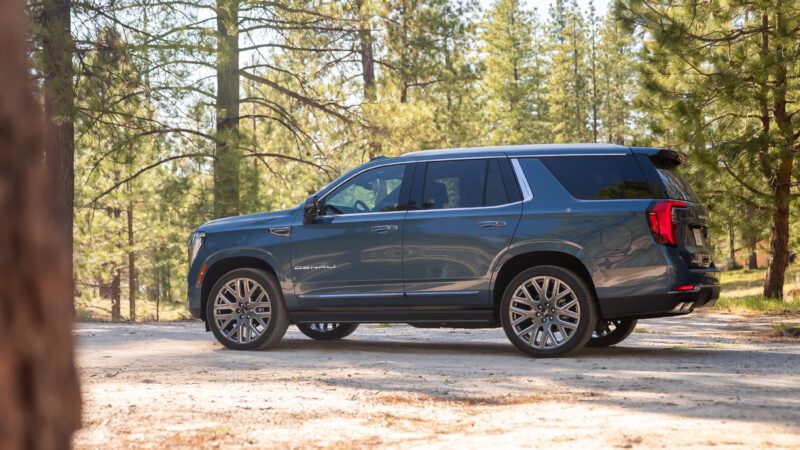
The problem exists for those who previously relied on the Escalade for low-key transportation. Driving a Rolls-Royce Cullinan guarantees you’ll be seen. But what if you don’t? That used to the Escalade’s turf alongside the BMW X7 and the Mercedes-Benz GLS; big three-row SUVs with ample space, all of the luxury fittings you’d want in a commuter, and guaranteed anonymity. With the Cadillac’s sights set firmly on an entirely different crowd, we can add the 2025 GMC Yukon Denali Ultimate to that list.
I’ll admit that before the opportunity to drive one appeared, the GMC Yukon Denali Ultimate wasn’t on my radar. Aside from a review of the off-road AT4 trim I did over four years ago, my only contact with the Yukon since has been from the back seat of an Uber Black.
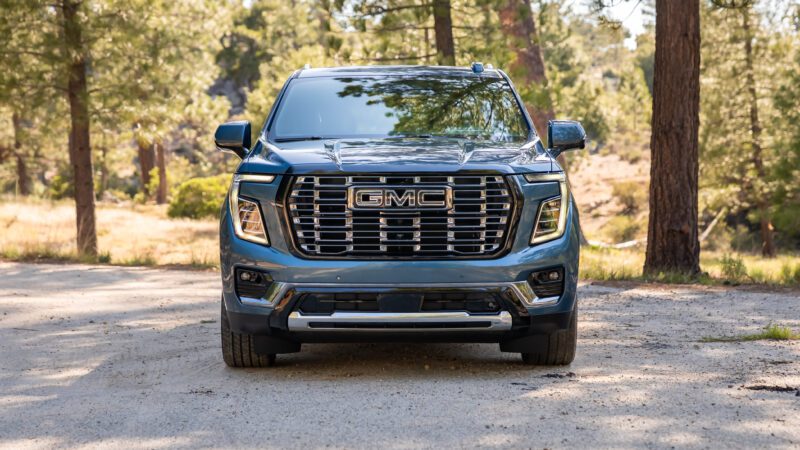
Today, the Yukon is GMC’s flagship internal-combustion SUV, and the Denali Ultimate is its range-topping variant. It starts at $103,295, including a $1,995 destination fee, and comes loaded with standard equipment, making this tester’s list of optional extras relatively short. It adds Night Vision for $2,000, the Illumination Package for $1,195, and a Floor Liner Package for $475. Even its Downpour Metallic exterior paint costs only $495, bringing its as-tested price to $107,460.
As such, there aren’t many decisions to make when configuring one. You can choose between seven different exterior colors, five wheel designs measuring 22 or 24 inches, and an interior package that upgrades the second-row seats. It replaces the almost cardboard flat captain’s chairs in my tester with a more premium, bolstered, and ventilated set in case you plan to be driven rather than driving yourself.
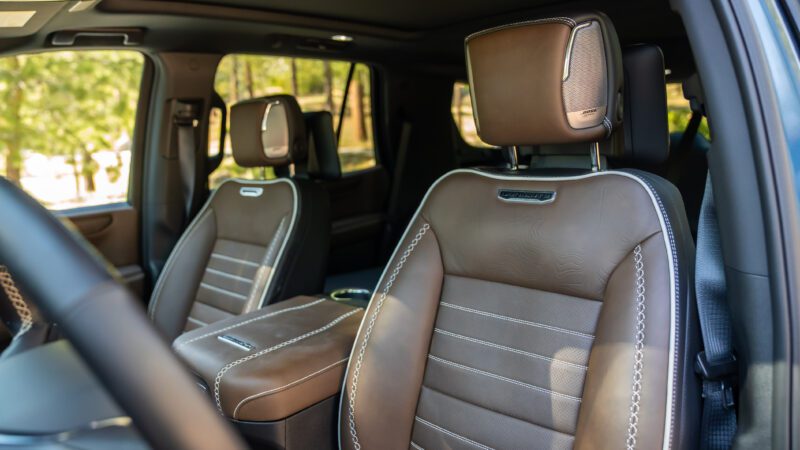
Crucially, there is just one interior color available, which is the Woodland Mahogany photographed above, accented with white stitching and laser-etched wood trim. If this LongHorn Steakhouse vibe isn’t quite your speed, you can step down from the Ultimate to the Denali and pick between off-white or black leather. However, you’ll miss out on the range-topper’s excellent 22-speaker Bose sound system.
As far as this interior’s livability goes. It’s a pleasant place to be. It remains relatively quiet on the highway. Its front seats are supportive but not firm, and this truck’s air suspension system has no trouble soaking up larger bumps at speed. As is common, the GMC Yukon Denali Ultimate features a digital instrument cluster and a central touchscreen for its infotainment. The latter is a gigantic 16.8-inch display that makes reading maps at a glance effortless while offering enough real estate to have multiple apps open simultaneously.
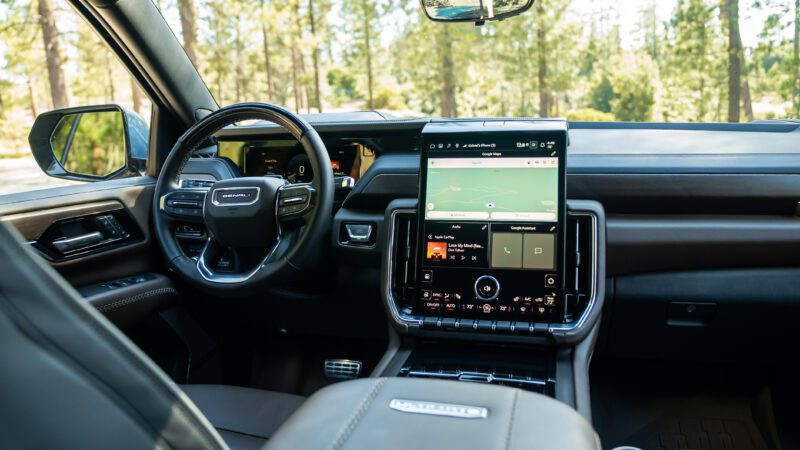
While you can adjust vital cabin settings through the touchscreen, GMC made the excellent decision to retain physical controls via a row of switches that are almost hidden in plain sight. The result is an interior that feels high-tech without losing its tactility. While some of this SUV’s plastic buttons feel somewhat out of place in a vehicle costing six figures, the Denali Ultimate makes up for it by being easy to use and including GM’s fantastic Super Cruise driver-assist system. Not only does it allow for hands-free driving, but it also does a good job of keeping this family hauler centered in the lane, even if Los Angeles’ road markings aren’t always the most clearly defined.
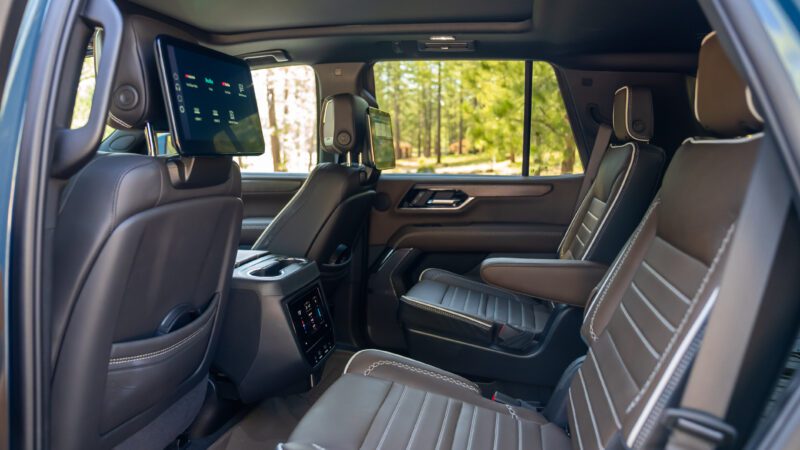
This brings me to the main reason why you’d buy a GMC Yukon Denali Ultimate, and that is its size. Its second and third rows fold flat, leaving you with a cavernous trunk with 122.9 cubic feet of space. What’s on offer here is versatility, and should you need more of it, the stretched XL variant exists.
From a driving perspective, you’ve got another choice to make. GMC offers the Denali Ultimate in two configurations: either with a turbocharged 3.0-liter Duramax inline-six diesel engine or a naturally aspirated 6.2-liter V8. The former develops 305 horsepower and 495 pound-feet of torque, while the latter produces 420 hp and 460 lb-ft. Regardless of which you go for, however, you’ll get a 10-speed automatic transmission, all-wheel drive, and an air suspension setup.
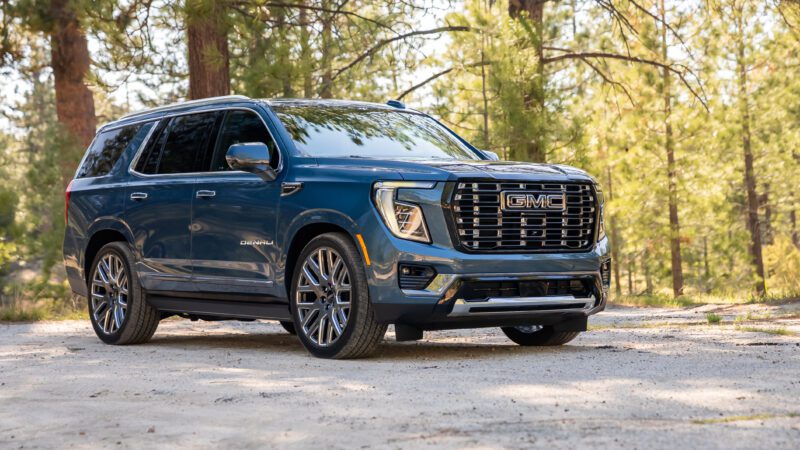
My tester sports the V8, and its chrome quad exhaust tips promise a burbly engine note that only partially materializes. Whether you’re standing by it or sitting inside, the GMC Yukon Denali Ultimate is remarkably quiet, underscored by a low, burbling hum. Even as you press the accelerator, you don’t get much of an engine note in the cabin, a plus given this SUV’s luxurious aspirations but a minus if you opted for the eight-cylinder route to hear them sing.
It’s a similar story once you hit the road. While GM’s 10-speed automatic transmission can be somewhat slow and clunky in other products, that isn’t the case here. It shifts both smoothly and quickly, attempting to maximize the available power. However, even with 460 lb-ft of torque, the Yukon feels sluggish, especially at highway speeds. Overtaking requires a boot-full of throttle, which is less surprising once you consider the Ultimate’s over 5,800-lb curb weight. If it manages to be just as quiet in most applications, the 3.0-liter diesel and its extra torque is the one to have.
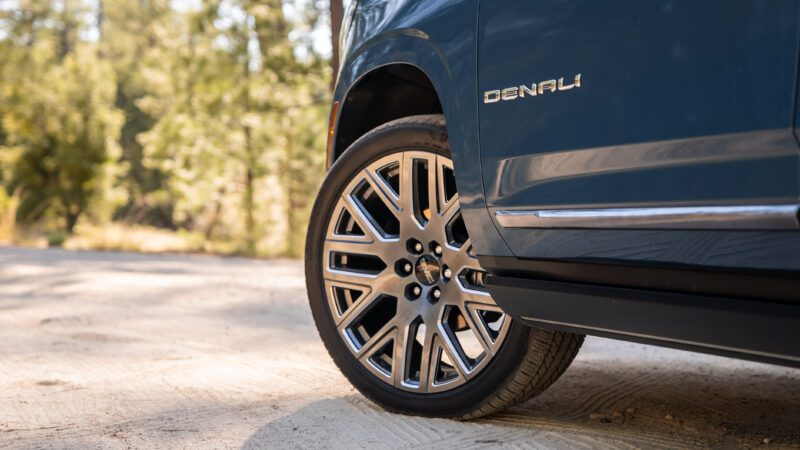
As I’ve alluded to, the GMC Yukon Denali Ultimate is based on the same platform as the Sierra pickup, and this body-on-frame SUV only partially conceals its truck roots. Its steering is heavy and pairs with a slow ratio. Unlike rivals like the BMW X7, the Ultimate lacks rear-axle steering, making it more challenging to maneuver through tight spaces. Simultaneously, its tall and flat hood limits forward visibility, although an onboard camera suite helps out considerably.
The GMC’s air suspension does the most heavy lifting. While Yukons that lack it often deliver a bouncy ride, that isn’t the case in the Denali Ultimate. It does a great job of handling undulations and road imperfections at highway speeds. However, it does have a tendency to struggle at slower speeds, picking up plenty of vibrations over rougher surfaces, a con of its massive 24-inch wheels.
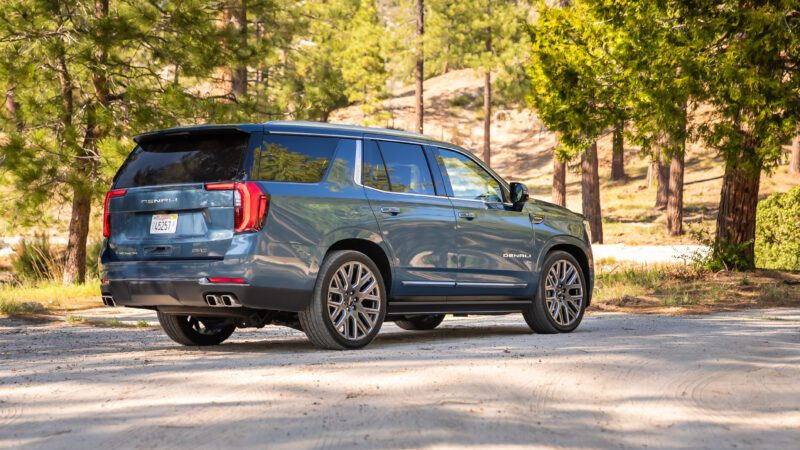
From a visual standpoint, it’s challenging to make what is essentially a giant box, designed to carry as much stuff and people as possible, look great. Still, the Denali Ultimate makes a valiant effort. Its Downpour Metallic exterior finish introduces some vibrancy while retaining a classy look. While this SUV features chrome trim, it is applied tastefully throughout. And while this GMC’s front grille is somewhat overbearing, its LED running lights are tastefully restrained.
The biggest aesthetic challenge it faces has less to do with its appearance and more to do with who buys it. As I mentioned earlier, a GMC Yukon has pulled up to my house when I’m on the way to the airport more times than I can count. You’ll often spot them in major cities across the US, as part of a car service fleet or driven by those looking to make top dollar on rideshare apps like Uber or Lyft. It’s a fact I kept getting reminded of every time I walked up to the Denali or saw another in chauffeur-spec at a stoplight. While it’s something you can ignore if you’re looking at one of the Yukon’s less expensive trim levels, it’s much harder to do so when you’re shelling out six figures for one.
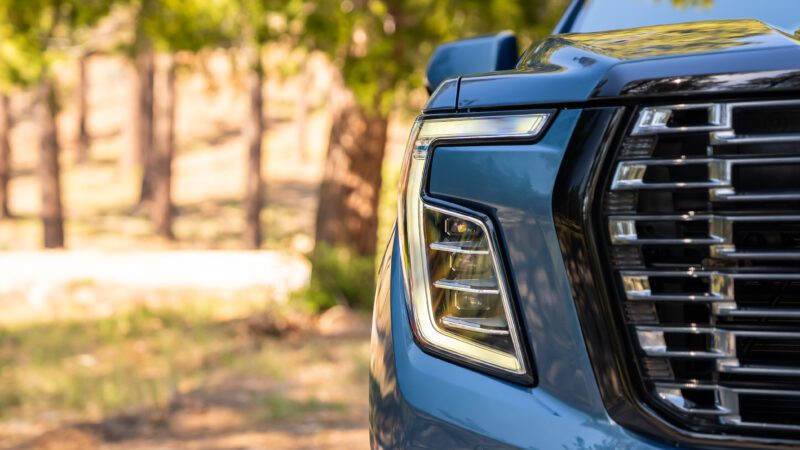
After a week behind the wheel, it’s clear that the GMC Yukon Denali Ultimate has many strengths. It’s tremendously spacious and offers an excellent in-cabin experience, both in terms of tech and comfort. Considering that it tops out in the low six-figure range, it’ll cost you less than an equivalent Range Rover, BMW X7, or Mercedes-Benz GLS.
However, as luxurious as the Denali Ultimate strives to be, it’s hampered by a driving experience that can’t shake its truck roots, an underwhelming engine, and an aesthetic that’s become ubiquitous for all the wrong reasons. Still, the Yukon manages to offer a luxury SUV experience in a package that allows you to fly under the radar. Despite some shortcomings, it’s ready to take up the mantle as the Escalade moves on.

